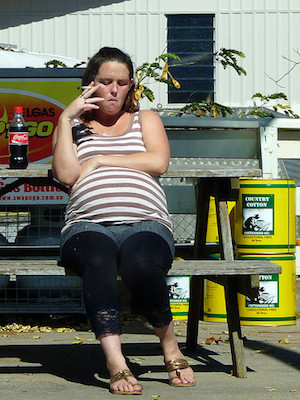Maternal smoking and low birth weight: comparative evidence from the smoking bans in Italy and the UK
Background
Maternal smoking is a risk factor both for mothers and their unborn children. However, it is a risk factor that can be modified by the individual.
Medical studies show that smoking during pregnancy increases the risk of low birth weight, reduces birth weight by about 150-200 grams, and increases the incidence of neonatal deaths and Sudden Infant Death Syndrome.
In recent years, many industrialised nations have banned smoking from work and public places. Public smoking bans, in particular, have been introduced as a means of reducing the exposure of non-smokers to second-hand smoke. Recent studies show that these bans have decreased environmental tobacco exposure in the general population but have also increased quitting rates among smokers.
The key question is whether recently implemented bans have also led to a reduction in the smoking behaviour of pregnant women, and whether this has impacted upon the health of newborn children.
Whilst smoking rates are similar across Europe, smoking is much less associated with socio-economic background in some countries when compared with others. This may well mean that the impact of the ban will vary between countries.
Project aims
The project aims to see whether recently implemented smoking bans in Italy, Scotland and England have been successful. In Italy, the aim is to see whether the ban had any impact in terms of reducing smoking rates of pregnant women and improving the health of newborn children.
The project also seeks to measure the impact of smoking bans in England and Scotland and to derive a measure of the impact of smoking in pregnancy on children’s birth weight in England for comparison with results from Italy.
Data sources and methods
Administrative birth records for Italy, England and Scotland,
The 2005 Italian Survey on Health (ISH)
The 2007 Health Survey for England (HSE).
Information Services Division, Scotland (ISD)
In the first part of the project, the researchers will derive a measure of the impact on children’s birth weight, gestation, APGAR (Appearance, Pulse, Grimace, Activity, Respiration) scores, congenital malformations, and neonatal mortality, using Italian hospital birth records for the period between 2002 and 2008.
Making use of a survey of 60,000 people interviewed one month before and three months after the Italian ban in January 2005, the research team will estimate its effect on smoking rates and the number of cigarettes in the general population and in the population of pregnant women.
The second part of the project focuses on the UK, developing a measure of the impact of smoking during pregnancy on a child’s health. Using data from the Office for National Statistics in England and the Information Services Division (ISD) in Scotland, it will identify changes in infant health outcomes before and after the 2006 Scottish ban.
The researchers will create a measure of the impact that smoking in pregnancy has on a child’s birth weight. The findings will then be used to make comparisons in outcomes between England and Italy.

Team members
Professor Emilia Del Bono
Professor of Economics - ISER - University of Essex
Dr Del Bono is leader of this project. She is also the Principal Investigator on the Economic and Social Research Council (ESRC) funded project _The effects of breastfeeding on children, mothers and employers_.Professor Cheti Nicoletti
Professor of Economics - University of York
Cheti Nicoletti is a Professor in the Department of Economics and Related Studies at the University of York. She is also an ISER Research Associate.Dr Daniela Vuri
Associate Professor University of Rome - University of Rome
Daniela Vuri is Associate Professor at the University of Rome "Tor Vergata" and also acts as Associate Chairman at the Department of Economics and Finance.Publications
Seasonality in smoking behaviour: re-evaluating the effects of the 2005 public smoking ban in Italy
Emilia Del Bono, Klaus Grunberger, Daniela Vuri,ISER Working Paper Series

Photo credit Boobook48
Start date
31 Aug 2011
End date
28 Feb 2013
Funder
British Academy
Data sources
- Health and Social Care Survey for England (HSE)
- Italian Health Survey 2005
- Information Services Division Scotland